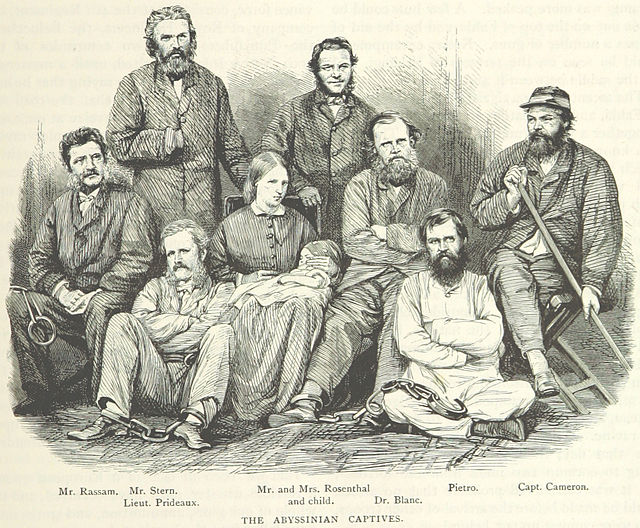Hormuzd Rassam was an Assyriologist and author. He is known for making a number of important archaeological discoveries from 1877 to 1882, including the clay tablets that contained the Epic of Gilgamesh, the world's oldest notable literature. He is widely believed to be the first-known Middle Eastern and Assyrian archaeologist from the Ottoman empire. He emigrated to the United Kingdom, where he was naturalized as a British citizen, settling in Brighton. He represented the government as a diplomat, helping to free British diplomats from captivity in Ethiopia.
Hormuzd Rassam in Mosul c. 1854
Rassam (far left) with the other captives of Tewodros II
The Rassam cylinder of Ashurbanipal is named after its discoverer Hormuzd Rassam. It is a 10-sided prism and the most complete of the chronicles of Ashurbanipal, Nineveh, 643 BCE. British Museum.
Assyriology, also known as Cuneiform studies or Ancient Near East studies, is the archaeological, anthropological, historical, and linguistic study of the cultures that used cuneiform writing. The field covers Pre Dynastic Mesopotamia, Sumer, the early Sumero-Akkadian city-states, the Akkadian Empire, Ebla, the Akkadian and Imperial Aramaic speaking states of Assyria, Babylonia and the Sealand Dynasty, the migrant foreign dynasties of southern Mesopotamia, including the Gutians, Amorites, Kassites, Arameans, Suteans and Chaldeans. Assyriology can be included to cover Neolithic pre-Dynastic cultures dating to as far back as 8000 BC, to the Islamic Conquest of the 7th century AD, so the topic is significantly wider than that implied by the root "Assyria".
Reconstruction of the Babylonian Ishtar Gate in the Pergamon Museum in Berlin
A Lamassu from the Assyrian city of Dur-Sharrukin (Oriental Institute (Chicago))
First use of the word Assyriology (Assyriologues), 1859, Ernest Renan






